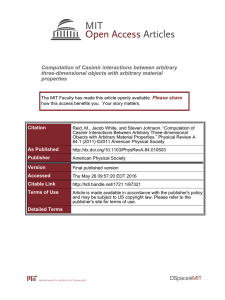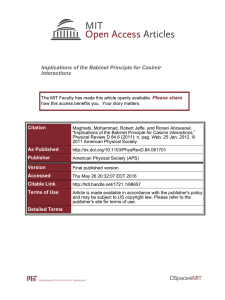Document
advertisement
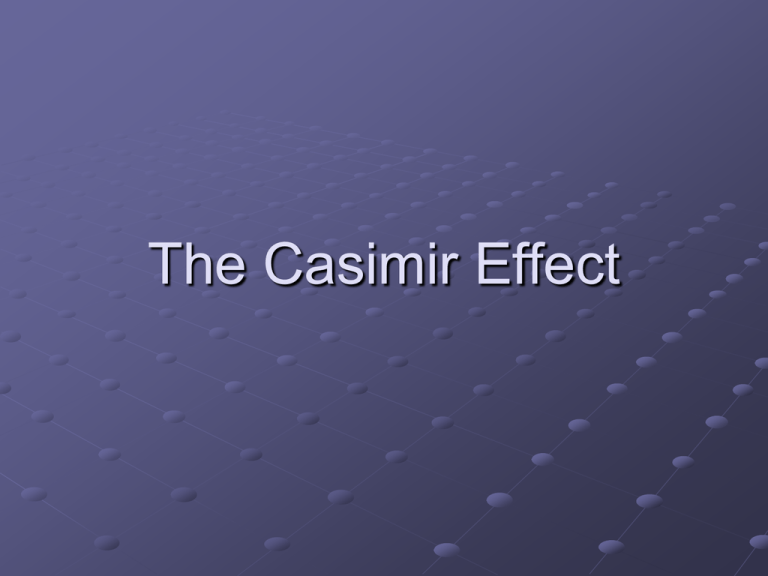
The Casimir Effect What is the Casimir Effect? Attractive force between two uncharged parallel plates F=(πhcA)/(480d4) Discovered by H.B.G. Casimir in 1948 Caused by the restriction of electromagnetic modes E=0 at surface of each conductor (think waves on a string) As the plates are moved together, fewer modes are viable With fewer modes available, the energy density of the space between the plates becomes less than the surrounding vacuum Lower energy density means there must be a force pulling the plates together. Comparison of Forces Consider a parallel plate capacitor with area A=0.01m2 and the distance between them, d, to be 0.01m. The voltage, V, between them is 30V Comparison of Forces Consider a parallel plate capacitor with area A=0.01m2 and the distance between them, d, to be 0.01m. The voltage, V, between them is 30V Electric Force: Q=CV C=ε0A/d, V=Ed F=EQ=V2C/d=(V2 ε0A)/d2 F=7.97*10-7 N Comparison of Forces Consider a parallel plate capacitor with area A=0.01m2 and the distance between them, d, to be 0.01m. The voltage, V, between them is 30V. Now, Consider the same plates, but with no potential difference between them. Casimir Force F=(πhcA)/(480d4) F=1.30*10-21 N Comparison of Forces Consider a parallel plate capacitor with area A=0.01m2 and the distance between them, d, to be 0.01m. The voltage, V, between them is 30V. Now, Consider the same plates, but with no potential difference between them. Lets make a rough comparison of the gravitational force by approximating them as point masses and saying that each plate has a mass of 0.1kg. Gravitational Force F=Gm2/d2 F=6.67*10-9 N But, because of the 1/r4 dependence, if d is very very small then the Casimir force will start to dominate. Why is the Casimir force is attractive? E field - + - + - + - + - + - + - + - + - + - + - + - + - + - + - + - + - + - + Forces Why is the Casimir force is attractive? e- Image Particles - + - + -- ++ Forces e- e+ - + - + -- ++ -- ++ -- ++ - - + - + - + + + - + e+ Image Particles Measurement of the Casimir Force Problems Casimir force is very weak Has a very short range (1/r4 dependence) Plates must be parallel First tentative experiments done by in 1958 (Spaarnay) In 1997, the technique of using a spherical “plate” with large radius overcame the problem of keeping the plates parallel. (Lamoreaux) Real World Applications Microelectromechanical systems (MEMS) Used in the manufacture of car airbag systems Casimir Force can make parts of MEMS stick together Casimir Force can also be used to control the movement of MEMS devices References “The Casimir effect: a force from nothing” from the September 2002 issue of Physics World “Resource Letter CF-1: Casimir Force” by S.K. Lamorceaux from the American Journal of Physics 67 (10) (October 1999) “Essentials of the Casimir effect and its computation” by E. Elizalde and A. Romeo from the American Journal of Physics 59 (8) (August 1991)
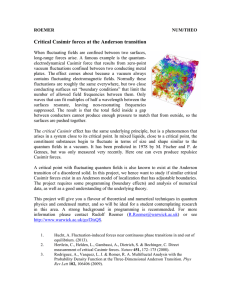
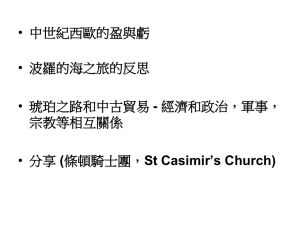
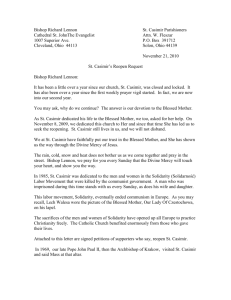
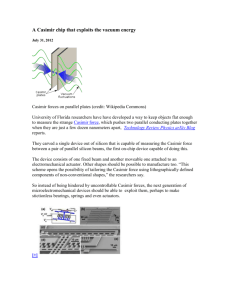
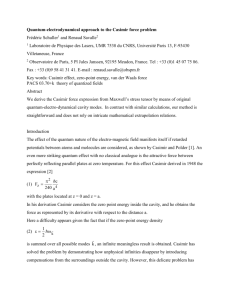
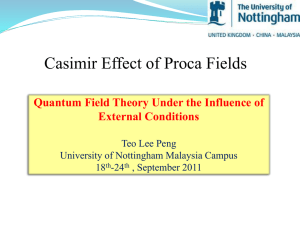


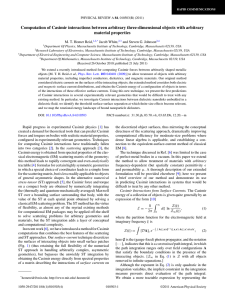
![*in memory of Larry Spruch (1923-2006) A73 [hep-th/0604119];[quant-ph/0705.3435].](http://s2.studylib.net/store/data/010565858_1-2fae8126b606a24fa53150d768730c35-300x300.png)
